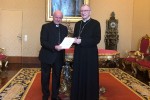2020 (EN)
|
22 July 2020
Tutte le Attività (EN) -
Anno 2020
 The Fondazione Mediterraneo supports and shares the document entitled "The Humana Communitas in the Pandemic era. Outdated reflections on the rebirth of life »: the second document - the first is from 30 March 2020 - which the Pontifical Academy for Life dedicates to the consequences of the global health crisis and its interpretation.
The Fondazione Mediterraneo supports and shares the document entitled "The Humana Communitas in the Pandemic era. Outdated reflections on the rebirth of life »: the second document - the first is from 30 March 2020 - which the Pontifical Academy for Life dedicates to the consequences of the global health crisis and its interpretation.
"In the suffering and death of so many people, we have learned the lesson of frailty," writes the text. The document underlines the importance of a change of pace: global efforts and a determined international cooperation are needed to face the challenge of a fairer and more just future, whose key words are better health care for all and vaccinations. "We still haven't paid enough attention, especially globally, to human interdependence and common vulnerability. The virus does not recognize borders, but countries have sealed their borders. Unlike other disasters, the pandemic has not affected all countries at the same time. Although this could have provided an opportunity to learn from the experiences and policies of other countries, the learning process globally was minimal. Indeed, some countries have sometimes engaged in a cynical game of mutual accusation".
"The Covid-19 phenomenon is not only the result of natural events. What happens in nature is already the result of a complex interaction with the human world of economic choices and development models, themselves "infected" with a different "virus" of our creation: this virus is the result, rather than the cause, of financial greed, of complacency towards lifestyles defined by consumption and excess. We have built an ethos of prevarication and contempt for what is given to us in the primordial promise of creation. For this reason, we are called to reconsider our relationship with the natural habitat. To recognize that we live on this earth as administrators, not as masters and lords". However «When compared to the difficulties of poor countries, especially in the so-called Global South, the troubles of the" developed "world appear rather like a luxury: only in rich countries people can afford to comply with safety requirements. In the less fortunate ones, on the other hand, "physical distancing" is simply impossible because of tragic needs and circumstances: crowded environments and impracticability of sustainable distancing constitute an insurmountable obstacle for entire populations. The contrast between the two situations highlights a strident paradox, which, once again, tells the story of the disproportionate well-being between rich and poor countries".
The crisis showed the possibilities and limitations of models focused on hospital care: "Of course, in all countries, the common good of public health must be balanced in relation to economic interests" and nursing homes and the elderly have been hard hit. It should also be added that "Ethical discussions on the allocation of resources were mainly based on utilitarian considerations, without paying attention to the most vulnerable people and those exposed to the most serious risks. In most countries, the role of general practitioners has been ignored, while for many, they are the first point of contact with the care system. The result has been an increase in deaths and disabilities caused by causes other than Covid-19 ".
The response that must be given to the Covid-19 pandemic cannot be reduced on an organizational-managerial level. Rereading the crisis through, the text highlights how much we can learn on a deeper level. The fragility, finiteness and vulnerability in which all human beings have found themselves united urge us to a conversion that includes and elaborates existentially and socially the experience of loss, as a constitutive part of the human condition. Only starting from this awareness will it be possible to involve the conscience and a conversion that allows us to feel responsibly in solidarity in a global fraternity (cf. Pope Francis, Humana communitas, 6 January 2019).
Academics Contributed to the drafting of the text, prof. Roberto Dell'Oro, prof. Stefano Semplici, prof. Henk ten Have.






